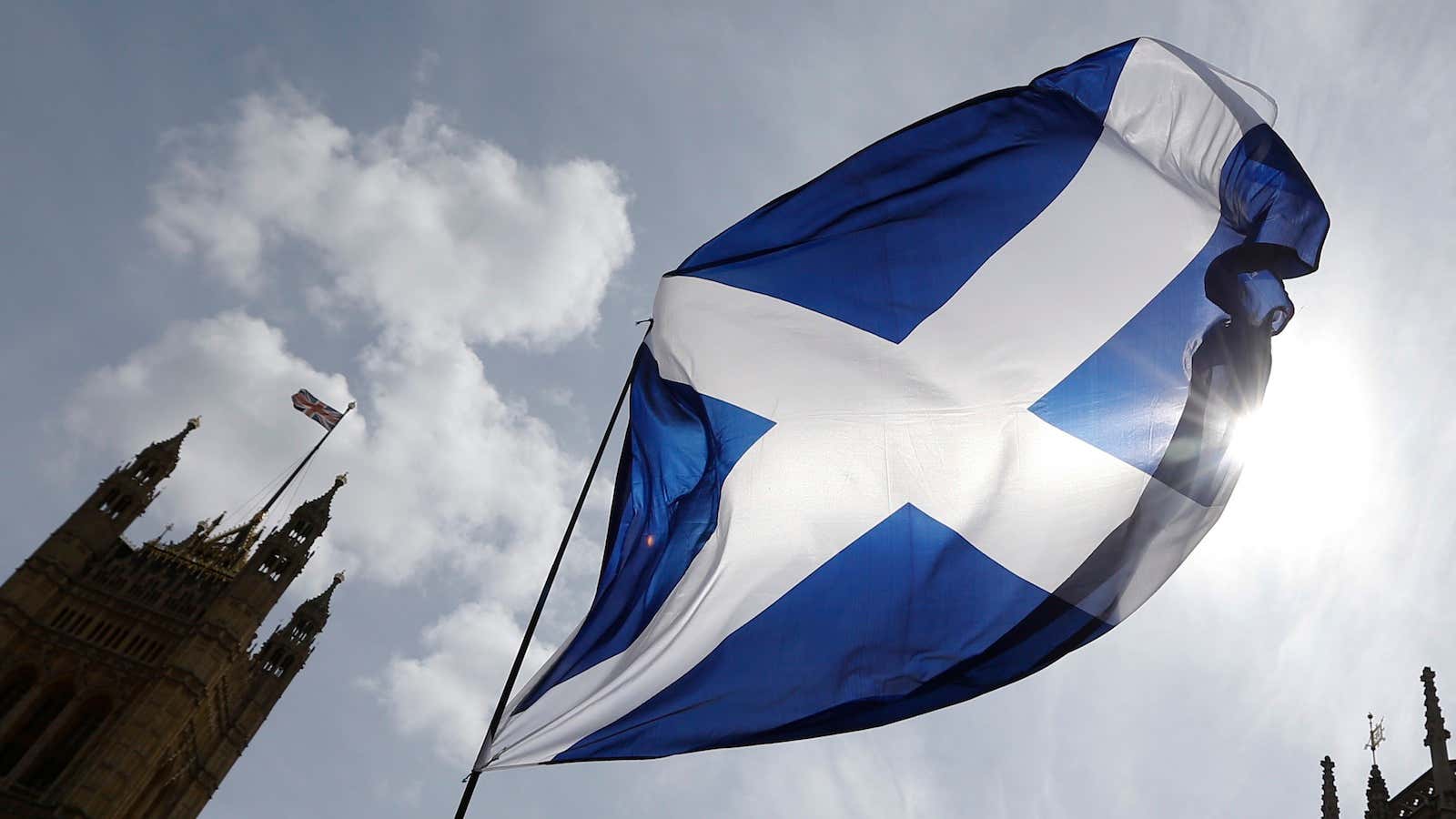Traveling through Scotland is obviously not a linguistic experience limited to the Scottish accent alone. Last year, Christine De Luca was appointed as Edinburgh’s poet laureate. She often writes in a Shetlandic dialect, and you can hear her work here.
And not only is there Scots—think of “Auld Lang Syne”—but there is, of course, Scots Gaelic, too, which dots the underside of nearly every rail station sign in the country. Going to Queen Street Station? Then you’re going to Glaschu Sràid na Banrighinn. Stopping off in Falkirk on your journey between Edinburgh and Glasgow? Then you’ll be stopping at An Eaglais Bhreac.
“In my early 20s I went through a period of writing only in Scots,” Ron Butlin, a former poet laureate of Edinburgh—that is, a “makar”—told Quartz. “It seemed to have been part of my growing up. Having written in English all through school … quite to my surprise one day I started writing in my childhood tongue.
“Over the next few years this mother tongue opened up my creativity, my emotional self,” he adds. “Until that day my poems had been getting more and more intellectual … the Scots opened up and reclaimed my emotional history.”
But despite advocacy from the Scottish government for Gaelic, despite the nuance of the language Butlin alights upon, there is still a problem— as the popular Gaelic singer Griogair Labhruidh characterized it to me, “the never ending exodus of its speakers and stalwarts from its heartlands, the constant influx of people whose attitude is that the Highlands and Islands [are] now English-speaking and therefore there is no need to learn.” It is a kind of “cultural colonization, Stockholm syndrome,” driven in large part by “[a] constant barrage of media and mainstream Anglo-American culture, and the inability of speakers and activists to galvanize themselves into units that can affect counter-colonization.”
And while there is a lot to unpack there—for instance, as Kirsty Scott wrote in 2003, kids were beaten for speaking the language in the past 100 years—a lot of it has to do with the fact that Gaelic is a minority language.
“Whenever a minority language is used,” Randy Waugh, President of the Gaelic Community of Ottawa, Canada, told Quartz, “the reaction of people is fairly predictable … some see the value in its retention, and welcome people using their language and culture as a way of expressing who they are and where they derive from.”
And “some don’t want others to speak anything other than what they understand,” he notes. “Some find any time or investment in anything other than the here and now as a waste of time, energy and money—this particularly in a world of austerity and belt-tightening.” And, finally, “some had no idea this is what the language of their forebears sounded like, and are intrigued and become involved to varying extents, from attending events to learning the language themselves as seeing a way of reconnecting with their past.”
“For the language to survive we need investment from the outside,” Labhruidh adds, “In small community projects that will promote the language as an alternative to the mainstream British culture that pervades every level of our society.”
“In this age of world heritage sites and buildings,” Waugh says, “I believe that the diaspora and respective governments bear a responsibility in keeping the language alive through projects and events centered around the promotion of music, poetry, stories and reconstructions of the history that host countries were founded on and built upon. The Internet has by far provided the greatest hope in connecting the Gàidhlig world, both in the highlands and throughout the diaspora.”
“I think that would be a most helpful solution,” Labhruidh said, when it came to considering the potential linguistic investment role of the Scottish diaspora. “The Scottish diaspora could be doing a lot more to try and preserve the indigenous culture of Scotland rather than constantly contributing to the colonized ‘tartan tack’ version of our culture which prevails at the moment.”
